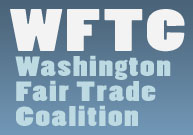
LOCAL
Seattle City Council votes 9-0 to oppose Fast Track
The following is from the Washington Fair Trade Coalition:
 SEATTLE (March 31, 2015) — With a convincing 9-0 vote, the Seattle City Council passed a resolution Monday opposing Trade Promotion Authority (“Fast Track”) for the Trans-Pacific Partnership. The Seattle City Council sends a strong message that communities in the most trade dependent state in the union don’t want to be fast tracked into bad trade policies. By expressing its concerns about the Trans-Pacific Partnership, the Seattle City Council is showing the way to better trade policies with strong labor and environmental standards.
SEATTLE (March 31, 2015) — With a convincing 9-0 vote, the Seattle City Council passed a resolution Monday opposing Trade Promotion Authority (“Fast Track”) for the Trans-Pacific Partnership. The Seattle City Council sends a strong message that communities in the most trade dependent state in the union don’t want to be fast tracked into bad trade policies. By expressing its concerns about the Trans-Pacific Partnership, the Seattle City Council is showing the way to better trade policies with strong labor and environmental standards.
The federal Fast Track legislation would establish a process that allows no amendments and limited debate on trade agreements like the Trans-Pacific Partnership agreement currently pending in Congress.
“Trade and the massive 12-country TPP will impact every resident in Seattle in when it comes to our future labor rights and environmental sustainability,” said Dave Freiboth, Executive Secretary of the M.L. King County Labor Council, AFL-CIO. “We applaud the Seattle City Council for saying ‘no’ to Fast Track and saying ‘yes’ to open debate about a different trade policy that will balance trade, combat income inequality and lift standards around the world.”
“Thank you to Councilmembers Burgess, Clark, O’Brien, and Sawant for crafting the resolution, working it through the council and for standing with workers, public health and the environment,” added Gillian Locascio, Coordinator for the Fair Trade Coalition.
“We have been incredibly innovative in Seattle with our sick leave policies, the $15 minimum wage and our local hire provisions. That’s why it’s so important for our city council to speak out against national policies that could jeopardize these strong standards,” said Lynne Dodson, Secretary Treasurer of the Washington State Labor Council, AFL-CIO.
Under the TPP, cities like Seattle are at risk of having local environmental and labor standards challenged by multinational companies who could bring lawsuits outside the U.S. judicial system as a means to seek damages. This approach could give global tribunals, such as the World Trade Organization, authority to enforce international trade law, overriding local, state and federal regulation. This trade agreement could specifically jeopardize Seattle’s paid sick leave, minimum wage and local hire policies giving foreign companies potential legal standing to sue local jurisdictions over labor and environmental policies.
“Seattle’s deep-rooted values in democracy and environmental sustainability, and its recognition of the urgent need to act on climate change, are inconsistent with fast tracking a massive trade agreement like the TPP,” said Selden Prentice of 350 Seattle, an organization fighting for climate justice which encouraged the city council to pass the resolution.
A diverse coalition of more than 60 Seattle-area organizations representing labor unions, community organizations and faith, immigrant and public health groups joined together in support of the Seattle City Council resolution that opposes “Fast Track” trade authority for the Trans-Pacific Partnership (TPP).





